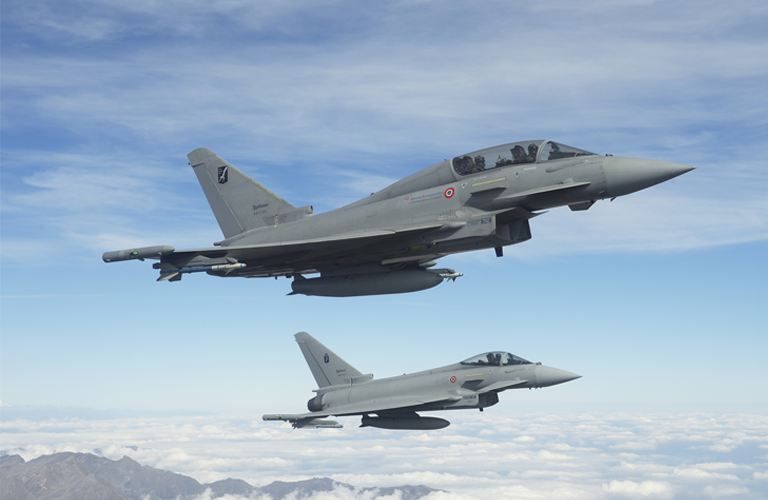An independent report published today by Strategy&, part of the PwC network, has revealed the impressive scale of the Eurofighter Typhoon programme’s contribution to economies across Europe.
The in-depth report examines the entire spectrum of development, production, and support activities, encompassing the four Eurofighter Typhoon partner nations of the United Kingdom, Germany, Italy and Spain.
It provides a comprehensive look into the programme and delivers compelling data showing the current economic benefits of the programme as well as anticipating future economic contributions, focusing in particular on the next 10 years.
The “base scenario” takes into account orders for new Eurofighter Typhoons from Spain (Halcon I and II) and Germany (Quadriga). This scenario shows that, for the next decade, the programme is set to contribute €58 billion to the GDP of the four core nations’ economies; generate tax revenues of €14 billion for the respective governments; and support 62,700 jobs annually.
Those numbers increase significantly in the report’s “growth scenario” with opportunities for sales of approximately 200 Eurofighter Typhoons on the domestic and export market.
This scenario shows, for the next decade, a programme contribution of €90 billion to GDP; tax revenues of €22 billion generated; and more than 98,000 jobs each year. The benefit of future export opportunities would mean that around 30 per cent of the core nation investment would return as tax revenues.
Giancarlo Mezzanatto, Chief Executive Officer at Eurofighter Typhoon, said: “The vital role that the Typhoon performs to keep Europe’s skies safe is widely known to all, however people are often less aware about the incredible economic benefits that the programme also brings.
“The Eurofighter Typhoon programme directly boosts European economies and supports tens of thousands of crucial aerospace jobs – benefiting the communities where we live and work. There is also significant spill over in regions where Eurofighter production lines are located and where the programme often sustains SMEs, start-ups and educational institutions.
“Therefore, new Eurofighter Typhoon orders are essential to sustain and retain defence industry production assets in Europe. This will guarantee national and European technological independence, and industrial knowhow resilience, to the core nations over a long period.”
Additional data published in the strategy& report shows that through the whole operational life of a single Eurofighter Typhoon aircraft, the contribution to the four core nations is €407 million of GDP and €100 million of taxes.
Mr Mezzanatto continued: “The Eurofighter Typhoon programme has more than 400 suppliers and contractors, who play a crucial role in providing R&D, design, production and in-service support.
“Continuous investment in the programme will not only keep the aircraft operationally effective and build a stronger aerospace defence industry in the decades to come but is an essential enabler for the development of the next-generation combat air system in Europe.”
Senior executives at the Eurofighter Partner Companies (EPCs) – Airbus, BAE Systems and Leonardo – have endorsed the benefits, brought by the Eurofighter Typhoon programme, and illustrated in the Strategy& study.
Jean-Brice Dumont, Head of Air Power at Airbus Defence and Space, said: “Eurofighter is undoubtedly the great European industrial and military project. It is a living programme, as the contracts signed with Germany for the Quadriga programme (38 new Tranche 4) and with Spain for the Halcón programme (20 new Eurofighters).
“Airbus is prepared to maintain the capability and tools and to produce further aircraft in Germany and Spain in line with potential customer needs.”
Simon Barnes, Group Managing Director, BAE Systems Air, said: “[The Eurofighter] Typhoon plays a significant role in protecting security and defence in Europe and the Middle East, in an increasingly complex global environment.
“The programme also makes a huge economic contribution and due to export sales the programme has already returned more than double the UK Government’s initial investment. Continued investment in Typhoon is crucial for European defence resilience and to ensure we protect the vital ecosystem that underpin our national industrial base.”
Lorenzo Mariani, Leonardo’s Co-General Manager, said: “Since its inception, the Eurofighter programme has played a crucial role in the development of advanced technologies and the employment of thousands of skilled professionals. This has also generated significant economic returns across the home markets involved in the project.
“The broad spectrum of activities carried out by Leonardo in the aircraft, electronics, sensors and system domains requires highly diversified involvement, which translates into an equally widespread and varied overall result with an important spill into our defence and civil business programmes.
“At Leonardo, we are extremely proud to be part of the Eurofighter Typhoon programme which represents the backbone of air defence in many countries and is set to grow and evolve in order to deliver through the next 30+ years, bridging to next-generation combat air systems.”
Follow us on our Telegram channel

